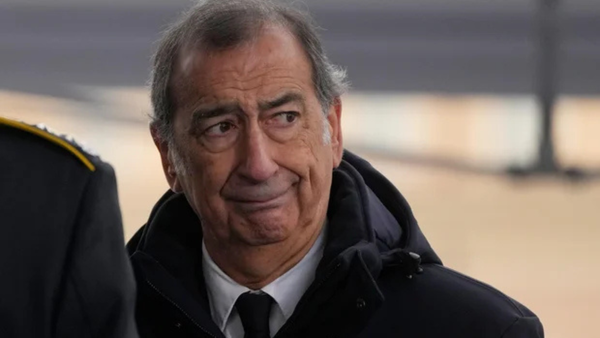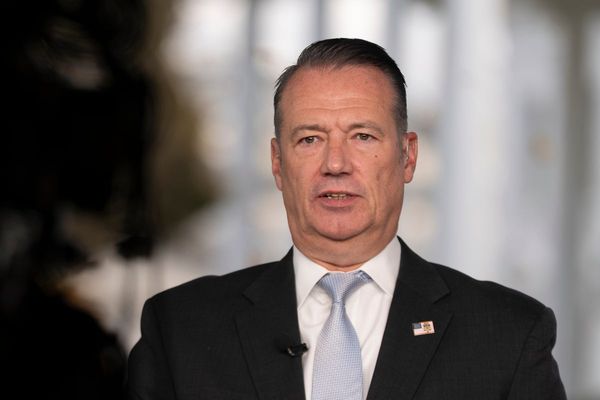
The magical ingredient required to become the president of Ireland is as mysterious as what Coca-Cola puts into its fizzy drink, but legions of voters think Catherine Connolly has it. The leftwing, independent TD (member of parliament) with the quiet composure and austere appearance of a contemplative nun has won an overwhelming victory to succeed the outgoing national treasure, 84-year-old poet Michael D Higgins. Her choice as the republic’s 10th head of state in a contest so bizarre it might have been scripted by Basil Fawlty has left the two government parties reeling.
Fianna Fáil’s candidate, Jim Gavin, hand-picked by the taoiseach, Micheál Martin, for his accomplishments in sport and the cultural bastion of the Gaelic Athletic Association, withdrew after it emerged he had failed since 2009 to refund €3,300 owed to a former tenant. Gavin’s name remained on the ballot paper as a ghost candidate. How Martin must rue the day Live Aid founder Bob Geldof phoned him last summer seeking the party’s nomination and he demurred because he already had Gavin in mind.
There is egg dribbling down the established media’s face too. Sinn Féin, the biggest opposition party, announced last month that it was supporting Connolly’s candidacy. When the party’s leader, Mary Lou McDonald, promised that this decision would be an election “gamechanger”, commentators scoffed, “some gamechanger”.
The five leftwing parties in the Dáil – Sinn Féin, Labour, the Social Democrats, People Before Profit and the Greens – forged an unprecedented collaboration to support Connolly’s independent candidacy. Her triumph has therefore exploded the shibboleth that the fractured left is an immovable obstacle to Sinn Féin ever forming a government.
Connolly’s election is also counter-cultural in an EU increasingly moving to the right and a climate of racism, anti-feminism and militarism.
Connolly was not a perfect candidate but she had two big advantages. For the past 35 years, since Mary Robinson became the first woman and first leftwing president of Ireland, the electorate has relished plumping for the edginess of an outsider – a hint of idiosyncrasy, even – in the country’s first citizen. It seems to satisfy a national self-image of nonconformism, albeit never manifested in parliamentary elections. One of the hottest-selling gift items during the current presidency was a Higgins look-alike knitted tea cosy.
Connolly’s bigger advantage, though, was the ABH (Anybody But Humphreys) factor. Heather Humphreys, a genial former government minister of the keep-talking-but-say-nothing old school – was lured out of retirement to represent Fine Gael after her party’s first choice, former EU commissioner Mairead McGuinness, dropped out for health reasons. When Humphreys’ vaunted potential to unify the island as a Presbyterian living beside the Irish border failed to find traction, Fine Gael launched an American-style negative campaign in a desperate attempt to stop her sliding further down the polls. An internet video accused Connolly of hypocrisy for attacking the banks’ role in Ireland’s catastrophic housing crisis when she had represented the banks in court as a barrister before her election to the Dáil in 2016. The tactic backfired when many voters objected to Fine Gael’s Trumpian tactics.
Connolly is one of of 14 children. She grew up in a local authority house in Galway. She is anti-war, anti-imperialist, pro-Ireland’s reunification and an advocate of disability rights. Like her predecessor, she has been critical of the EU’s inertia during Israel’s human slaughter in Gaza. Her more reckless pronouncements that France and the UK could not be trusted because of their arms industries, and likening Germany’s rearmament to the situation that prevailed in 1939, made many voters wary of what she might say as president. That risk, however, has proved preferable to the alternative of returning to old-style, pre-Robinson presidencies when the incumbents unfailingly toed the government line to the point of public irrelevance.
A psychologist and a lawyer, Connolly was often evasive during the campaign when questioned about a controversial visit she made to Syria during the Assad regime and her employment in the Dáil of a dissident republican who had been jailed on firearms charges. The latter, she said, was an exercise of her commitment to prisoner rehabilitation.
At 68, she is older than Humphreys but she had stronger appeal for younger voters who latched on to her civic society-style peacenik campaign. Her fluency in Irish, the state’s first official language, sharply contrasted with Humphreys’ inability to speak it in public. After decades of resisting the native tongue, speaking Irish has become cool for a generation tuned into Kneecap.
While her election is being feted by her backers, there is too a sense of a country holding its breath. An extraordinarily high number of spoilt votes in Friday’s election – exceeding Humphreys’s votes in some areas – coincided with two consecutive nights of violent rioting outside a Dublin accommodation centre for asylum applicants and war refugees last week. Leftwing parties, having coalesced under Connolly’s candidacy, will be at loggerheads again once the byelection is called to fill the Dáil seat she leaves vacant. Yet the seeds have now been sown for future cooperation on the left by way of a vote-transfer pact at the next general election which could offer the electorate a plausible choice between a government leaning right or one leaning left.
Martin’s error of judgment in selecting Fianna Fáil’s no-show candidate was echoed by its coalition partner, Fine Gael (led by the deputy prime minister, Simon Harris), when it picked Humphreys without an internal party process. The result is an emphatic humiliation. Mutterings of discontent in both parliamentary parties are already generating speculation about how long the two leaders can survive before the next general election – to be held by January 2029 at the latest.
For a position that is largely ceremonial and devoid of political power, the ramifications of this presidential election are likely to rumble on well past Connolly’s formal inauguration at Dublin Castle next month.
Justine McCarthy is a columnist with the Irish Times







